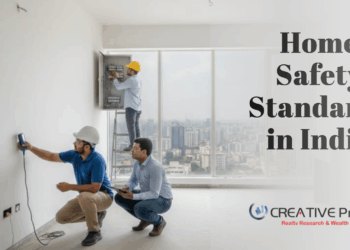In a city like Pune, where the real estate market is bustling with new developments, resale deals, and rental conversions, a home inspection is no longer optional—it’s essential. Whether you’re buying your first flat or investing in a property or considering a resale home, understanding the real condition of the property is crucial.
Here’s why skipping a home inspection in Pune could cost you more than just peace of mind.
Pune’s Construction Boom Brings Hidden Challenges
Pune has witnessed rapid urban growth over the past two decades. While this development has brought with it a wide range of housing options, it has also resulted in several challenges for homebuyers. The pressure on developers to meet tight deadlines often leads to compromised quality. A project might get completed on time, but shortcuts in construction, rushed finishes, or inexperienced labor can result in substandard quality that’s not immediately visible.
Common problems in such cases include:
- Incomplete waterproofing
- Low Grade tiling
- Poor plumbing fixtures
- Suboptimal electrical fittings
While these issues may not appear in a casual visit, a trained inspector can flag them before possession.
Area Specific Construction Risks in Pune
Pune is a geographically diverse city with neighborhoods that vary in elevation, soil type, and proximity to natural water bodies. This makes certain types of construction more prone to specific challenges:
Baner & Balewadi: Projects here are often built on sloping land, increasing risks related to water drainage and uneven foundation settlement.
Koregaon Park & Boat Club Road: Many buildings are decades old, and issues like deteriorating plumbing, outdated electrical systems, and pest infestations are more common.
Wagholi & Hadapsar: These fast developing areas sometimes see builders using temporary labor or rushing handovers, resulting in structural shortcuts or cosmetic patchups.
Home inspectors take into account these microlocation issues, giving you a more contextual evaluation.

Resale Properties: The Hidden Story
If you’re investing in a resale property, the need for a home inspection becomes even more critical. Unlike new construction, where builders are usually responsible for addressing issues during the defect liability period, resale properties are typically sold in their existing condition. This means the buyer takes full responsibility for any damages or repairs needed, unless specific fixes are agreed upon during the negotiation.
Common issues found in Pune’s resale homes include:
- Concealed water seepage from previous monsoons
- Fungal growth behind wardrobes or tiles
- Termite damage in wooden frames and cabinets
- Electrical systems not compliant with modern safety standards
Home inspections uncover these latent problems, enabling you to plan repairs in advance or negotiate the price accordingly.
DIY Checks vs. Professional Home Inspections
Homebuyers often believe that a walkthrough with a friend or contractor is sufficient to evaluate the home. While this might help spot obvious flaws, it doesn’t replace the detailed assessment done by a professional home inspector.
Professional inspections involve:
- Infrared cameras to detect hidden moisture in walls
- Spirit levels to assess floor evenness
- Moisture meters for damp detection
- Socket testers for electrical safety
These tools and techniques go far beyond what the human eye can see, giving you a comprehensive look at the property’s condition.
Key Components Evaluated in a Home Inspection
A structured inspection covers all the essential elements of the property. These include:
- Civil Work: Floor leveling, tile gaps, plaster quality, wall finishing
- Plumbing: Water pressure, pipe leakage, faucet alignment, drainage flow
- Electrical: Switchboard fitting, earthing checks, socket polarity, MCB panel functioning
- Structural Integrity: Door/window alignment, railing strength, beam and column condition
- Ventilation & Drainage: Airflow, exhaust system, sump pump inspection in low lying areas
In monsoon prone regions like Pune, waterproofing and drainage are especially critical.
When Should You Schedule a Home Inspection?
The best time to do a home inspection is before possession and before making the final payment. This gives you the opportunity to:
- Request the builder to fix identified issues
- Hold back final payments until repairs are made
- Document the condition in case of future disputes
For resale properties, an inspection should be done before registering the sale deed. If you discover major defects post registration, legal remedies become more complex.
Inspection Reports: Your Negotiation Tool
A detailed home inspection report doesn’t just identify problems—it strengthens your bargaining power. If the inspector finds issues you can either ask the seller to fix them before handover or use it as leverage to negotiate a reduced price.
This is especially helpful in Pune’s competitive real estate market where buyers are looking for ways to reduce closing costs.
Peace of Mind for NRI and First Time Buyers
For NRIs or buyers living in other cities, home inspections are even more valuable. When you’re not physically present to oversee construction or quality checks, hiring an independent inspector gives you a trustworthy eye on the ground.
First Time homebuyers, too, often miss signs of poor construction. A home inspection bridges that knowledge gap and ensures you’re not stuck with high maintenance costs right after moving in.
LongTerm Value Protection
A well inspected home will have fewer surprises in the future. It helps you:
- Avoid costly post possession repairs
- Ensure long term structural safety
- Maintain higher resale value
In Pune, where monsoons and heat both put stress on construction materials, periodic inspections can also help identify signs of wear early on.
Conclusion:
While home inspections are not legally required in India, they are crucial for making well-informed property decisions. A thorough inspection can uncover hidden defects, ensure compliance with safety standards, and offer valuable insights that protect your investment and save money in the long run.
For homebuyers, a professional inspection guarantees a structurally sound, safe, and high-value property. For sellers, it helps identify potential issues that may impact the property’s marketability and provides an opportunity to make necessary repairs before listing.
FAQ
1. Is a home inspection necessary for a newly built apartment in Pune?
Yes. Even newly constructed homes can have hidden issues due to rushed construction or improper finishing. A home inspection ensures quality and safety from day one.
2. What factors influence the cost of a home inspection in Pune?
The cost of a home inspection in Pune depends on several factors, including the size of the property, its location, and the complexity of the inspection required.
3. Can I do a home inspection myself?
While you can do a basic visual check, professional inspectors use specialized tools and have experience identifying issues you might overlook.
4. When is the best time to get a home inspection done?
Ideally, before taking possession or making the final payment. This gives you time to request necessary repairs or negotiate with the seller.
5. What happens if issues are found during a home inspection?
You can either ask the builder or seller to address them before handover or negotiate the price based on the cost of repairs.






